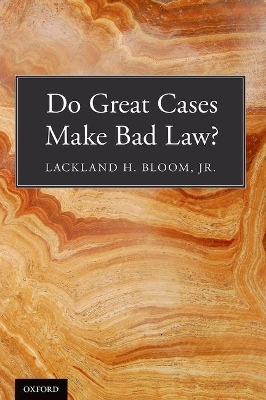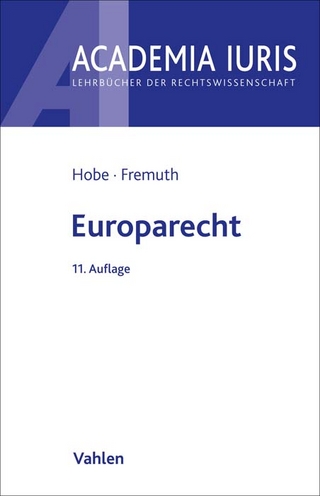
Do Great Cases Make Bad Law?
Oxford University Press Inc (Verlag)
978-0-19-084008-2 (ISBN)
Lackland H. Bloom, Jr. tests Justice Holmes' dictum in Do Great Cases Make Bad Law? He analyzes in detail the history of the Supreme Court's great cases, from Marbury v. Madison in 1803, to National Federation of Independent Business v. Sebelius, the Patient Protection and Affordable Care Act case in 2012. He treats each case with its own chapter, and explains why the Court found a case compelling, how the background and historical context affected the decision and its place in constitutional law and history, how academic scholarship has treated the case, and how the case integrates with and reflects off of Justice Holmes' famous statement. In doing so, Professor Bloom draws on the whole of the Supreme Court's decisional history to form an intricate scholarly understanding of the holistic significance of the Court's reasoning in American constitutional law.
Lackland H. Bloom, Jr. is a Professor of Law and Larry and Jane Harlan Senior Research Fellow at the Dedman School of Law, Southern Methodist University, where he has taught constitutional law for over thirty years. Professor Bloom previously served as Law Clerk to Chief Judge John R. Brown of the United States Court of Appeals for the Fifth Circuit and practiced law in Washington D.C. for four years before joining the law faculty at Southern Methodist University. A specialist in constitutional law, he has published numerous articles in the areas of freedom of speech, equal protection of the laws, constitutional interpretation, and the rhetoric of Supreme Court opinions. He served as Administrative Editor of the Michigan Law Review. He is the author of Methods of Interpretation: How the Supreme Court Reads the Constitution (Oxford University Press, 2009).
Acknowledgments
Introduction
1. Marbury v. Madison
2. McCulloch v. Maryland
3. Gibbons v. Ogden
4. Prigg v. Pennsylvania
5. Scott v. Sandford
6. The Legal Tender Cases
7. The Slaughter-House Cases
8. The Civil Rights Cases
9. Pollack v. Farmers' Loan & Trust Co.
10. NLRB v. Jones & Laughlin Steel Corp.
11. Dennis v. United States
12. Youngstown Sheet & Tube Co. v. Sawyer
13. Brown v. Board of Education
14. The Reapportionment Cases
15. New York Times v. Sullivan
16. Miranda v. Arizona
17. The Pentagon Papers Case
18. Roe and Casey
19. United States v. Nixon
20. Bakke, Grutter & Gratz (and Fisher)
21. Bush v. Gore
22. National Federation of Independent Business v. Sebelius
23. Do Great Cases Make Bad Law?
Index
| Erscheinungsdatum | 13.10.2017 |
|---|---|
| Verlagsort | New York |
| Sprache | englisch |
| Maße | 234 x 156 mm |
| Gewicht | 689 g |
| Themenwelt | Recht / Steuern ► EU / Internationales Recht |
| Recht / Steuern ► Öffentliches Recht | |
| ISBN-10 | 0-19-084008-0 / 0190840080 |
| ISBN-13 | 978-0-19-084008-2 / 9780190840082 |
| Zustand | Neuware |
| Haben Sie eine Frage zum Produkt? |
aus dem Bereich


